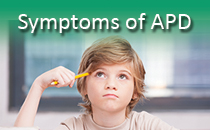Age Requirements
Auditory processing evaluations are most often performed on school age children although many adults are also tested. In order to be diagnosed with auditory processing disorder, a child needs to be at least 5 years old. However, early weaknesses in auditory processing skills can be identified in children as young as age 3. Since the brains of children this young haven’t matured enough to process a lot of complex information, fewer materials are available for this age range but some tests provide normative data in children as young as age 3.
Early intervention is critical. This is well documented in children with hearing loss, and young children showing early signs of struggling to understand spoken language or remember what is heard can benefit from activities to promote listening skills and stimulate language development. Auditory Processing Center believes that intervention for children showing weaknesses in listening skills should not be delayed based on a child’s young age. Many techniques used in auditory-verbal therapy and in auditory training in infants and young children with hearing loss can be very beneficial. There are activities that can be performed at home as well as many apps to promote listening skill development.
Normal or Near Normal Hearing
The individual should have a normal audiogram. If the child has only had a hearing screening (like what is done in schools or pediatrician’s offices), the child will need a full audiological evaluation prior to being seen for an APD evaluation. This can easily be done on the same day as the APD evaluation. Some auditory processing tests can be administered to individuals with hearing loss, but for a full APD evaluation an individual needs to have normal pure-tone thresholds.
Cognitive Functioning
The child should either have normal intelligence (IQ) or the cognitive assessment scores from psychological testing must be provided so that test results can be interpreted correctly. Often nonverbal intelligence tests, which are language free measures of cognitive ability are more reliable and provide a more accurate measure of intelligence in individuals who have problems processing verbal information. On tests that provide both verbal and non-verbal measures, a discrepancy in scores is often seen, with significantly better nonverbal performance in individuals with auditory processing issues. However, this is not always the case if the child has visual processing disorder causing poor visual perceptual skills. The better measure, which could be verbal or nonverbal, should be considered when estimating a child’s cognitive potential. Even if scores are mildly delayed for the child’s chronological age, APD testing can still be performed. At Auditory Processing Center we are able to convert scores to a child’s mental age equivalent so that APD testing is accurate. Failure using the child’s mental age equivalent would indicate that the child has a real auditory processing deficit not specific to the child’s cognitive/intellectual or developmental limitations. Auditory Processing Center has successfully evaluated many individuals with below average IQ as well as moderate to high functioning individuals on the autism spectrum. Referrals are considered on a case by case basis based on individual circumstances, needs, and abilities.
Speech Articulation
Both children with normal speech and children with articulation errors can be tested. Most testing in an auditory processing evaluation requires the listener to repeat information heard. Therefore, the child’s speech must be understandable in order to administer these assessments. Children with substantial speech articulation errors can still be evaluated, but different assessments that require the child to pictures are often used so that tests can be scored accurately. Persistent articulation errors when the child has been receiving speech-language therapy is a big red flag that the child is not perceiving speech sounds correctly because we talk the way we hear.
Attention
The child’s attention skills need to be within an average range, or if the child has ADD/ADHD it needs to be effectively managed with medication. It is important to be confident that poor performance on the APD test battery is truly reflecting your child’s auditory processing skills. Listening is an active process that requires attending to and focusing on things of interest while dismissing things of less interest. If an attention deficit is suspected, your child’s auditory attention skills may be screened prior to administering the APD battery. APD testing is administered in short segments and children are given several play breaks while tests are being scored. Auditory Processing Center also utilizes some tests that compare your child’s scores in noise to his/her own baseline of performance in quiet conditions. When interpreted as a part of a full test battery, these assessments are resistant to the effects of attention. Therefore, in children with suspected attention deficit, a reliable APD evaluation can still be obtained.



